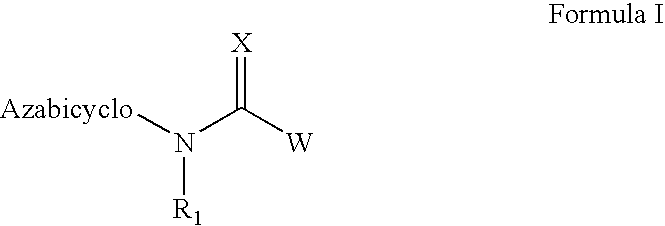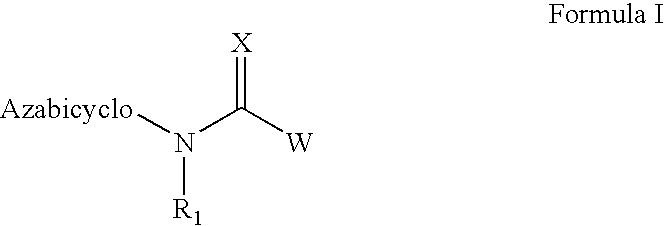Azabicyclic compounds for the treatment of disease
a technology of azabicyclic compounds and azabicyclic compounds, which is applied in the direction of heterocyclic compound active ingredients, drug compositions, biocides, etc., can solve the problems of limiting the functional assays that can be used, the receptor is rapidly inactivated (100 milliseconds) and the test is difficult to prove. , to achieve the effect of lowering the activity of the pharmaceutical composition and increasing the activity
- Summary
- Abstract
- Description
- Claims
- Application Information
AI Technical Summary
Benefits of technology
Problems solved by technology
Method used
Image
Examples
example 1
N-[(2S,3R)-2-methyl-1-azabicyclo[2.2.2]oct-3-yl]-2-naphthamide hydrochloride
[0495]
[0496]2-Naphthoic acid (0.19 g, 1.1 mmol) and TEA (1.0 mL, 7.2mmol) are dissolved in 10 mL THF. Diphenylphosphinic chloride (0.26 g, 1.1 mmol) is added dropwise. After 0.5 h, (2S,3R)-2-methyl-1-azabicyclo[2.2.2]octan-3-amine dihydrochloride (0.21 g, 1.0 mmol) is added, and the reaction is allowed to stir at RT. After 1 day, 1N NaOH is added, and the mixture is extracted with CHCl3. The combined organic layers are dried (MgSO4), filtered and concentrated. The residue is purified by chromatography (Biotage 40S, 90:9:1 CHCl3 / MeOH / NH4OH). The hydrochloride salt is prepared and recrystallized from MeOH / EtOAc to provide 0.246 g (74%) of the product. HRMS (FAB) calcd for C19H22N2O+H 295.1810, found 295.1815.
example 2
N-[(3R)-1-azabicyclo[2.2.2]oct-3-yl]-7-methoxy-2-naphthamide
[0497]
[0498]N-Phenyl-bis(trifluoromethanesulfonamide) (6.14 g, 17.2 mmol) is added to a solution of 2-hydroxy-7-methoxy naphthalene (3.0 g, 17.2 mmol) and TEA (2.4 mL, 17.2 mmol) in CH2Cl2 (75 mL). The reaction is allowed to stir for 4 hours then poured into water. The resulting solution is extracted three times with CH2Cl2. The combined organic extracts are dried (Na2SO4), filtered and concentrated. The resulting material is purified by column chromatography (step gradient, 25–50% CH2Cl2 in hexanes) to give 7-methoxy-2-naphthyl trifluoromethanesulfonate as a clear oil (4.95 g, 94%). HRMS (EI) calculated for C12H9F3O4S: 306.0174, found 306.0169.
[0499]A solution of 7-methoxy-2-naphthyl trifluoromethanesulfonate (4.95 g, 16.1 mmol) in DMF (20 mL) is degassed by repeatedly evacuating the flask then flushing with N2. Zinc cyanide (1.13 g, 9.7 mmol) is added followed by Pd(PPh3)4 (930 mg, 0.81 mmol). The resulting mixture is aga...
example 3
N-[(3R)-1-azabicyclo[2.2.2]oct-3-yl]-5-methoxy-2-naphthamide hydrochloride
[0502]
[0503]Bromocatecholborane (4.11 g, 20.7 mmol) is added to a solution of 1,6-dimethoxynaphthalene (3.89 g, 20.7 mmol) in dichloroethane (60 mL). The resulting solution is heated to reflux for 72 hours, allowed to cool, and then poured into 1N HCl. The resulting mixture is extracted three times with CH2Cl2. The combined organic layers are dried (Na2SO4), filtered and concentrated to dryness. The product is purified by three columns (step gradient of 50–60–65%CH2Cl2 in hexanes) to give 5-methoxy-2-hydroxy naphthalene as an oil that solidifies on sitting (955 mg, 27%). 1H NMR (300 MHz, CDCl3) δ 8.17, 7.2–7.4, 7.0–7.1, 6.66, 5.08, 3.97.
[0504]2-[N,N-Bis(trifluoromethanesulfonyl)amino]-5-chloropyridine (1.81 g, 4.6 mmol) is added to a solution of 2-hydroxy-5-methoxy naphthalene (802 mg, 4.6 mmol) and TEA (640 μL, 4.6 mmol) in CH2Cl2 (15 mL). The reaction is allowed to stir for 2 hours then poured into water. Th...
PUM
| Property | Measurement | Unit |
|---|---|---|
| temperature | aaaaa | aaaaa |
| pH | aaaaa | aaaaa |
| temperature | aaaaa | aaaaa |
Abstract
Description
Claims
Application Information
 Login to View More
Login to View More - R&D
- Intellectual Property
- Life Sciences
- Materials
- Tech Scout
- Unparalleled Data Quality
- Higher Quality Content
- 60% Fewer Hallucinations
Browse by: Latest US Patents, China's latest patents, Technical Efficacy Thesaurus, Application Domain, Technology Topic, Popular Technical Reports.
© 2025 PatSnap. All rights reserved.Legal|Privacy policy|Modern Slavery Act Transparency Statement|Sitemap|About US| Contact US: help@patsnap.com



